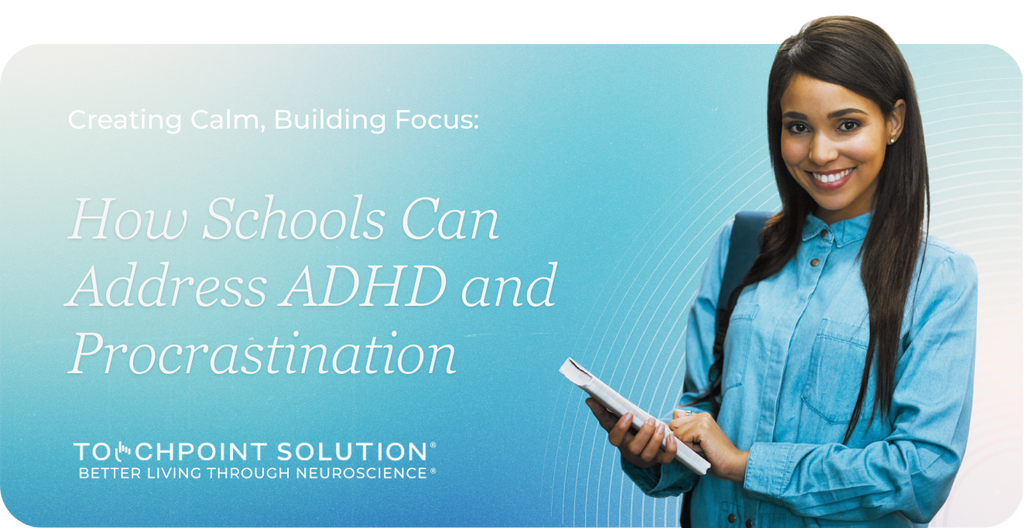Creating Calm, Building Focus: How Schools Can Address ADHD and Procrastination

Many students with ADHD aren’t simply delaying—they’re overwhelmed. What looks like procrastination is often an emotional roadblock: anxiety, sensory overload, or executive function barriers. Schools face this every day—distraction, disengagement, spikes in stress—and it all echoes through classrooms and hallways.
In U.S. schools, nearly 11.4% of children aged 3–17 have been diagnosed with ADHD (CDC Data and Statistics). Without intentional support, the cycle of anxiety and avoidance can pull them and the school system into frustration.
With ADHD Awareness Month in October coinciding with bullying prevention efforts, schools have a clear opportunity to offer not just academic support, but emotional support that enables students to thrive.
The ADHD-Procrastination Connection
Procrastination in students with ADHD isn’t a simple time management issue. Executive function differences—planning, motivation, and emotion regulation—create real barriers to starting and finishing tasks. One study found that even in college, ADHD-related procrastination often stems from emotional overload and low self-esteem. (Springer Nature Link Article) Among younger students, this cycle can spiral into academic frustration and disciplinary problems, especially when the environment lacks empathy or support. (Study Blog)
How Schools Can Support Focus & Engagement
Start with understanding, not judgment
Training for teachers and staff can help them see procrastination as a brain-based challenge, not just a behavior problem. When educators approach ADHD with compassion, they build a Healthy Thinking mindset across the school community, helping students feel seen rather than singled out.
Give students ways to reset emotionally
Emotional overload often fuels procrastination. Tools like TouchPoints offer students a discreet, physical way to regulate stress and anxiety before tackling tasks. When emotions feel manageable, starting work feels less overwhelming.
Build connection into learning
Peer support systems, such as having “focus buddies,” help students feel less isolated while completing assignments. Healthy Relationships create a sense of belonging and accountability, both of which are key to building resilience and reducing isolation.
Add movement breaks throughout the day
Add short stretch breaks, such as a 2-minute stretch or a hallway walk. Physical activity helps recalibrate their attention, allowing them to feel physically grounded enough to return to tasks with clarity and stay healthy at the same time.
Celebrate small steps
Large assignments can often feel overwhelming. Breaking assignments into smaller, achievable milestones and celebrating progress gives students a sense of purpose and accomplishment, boosting motivation and confidence.
Spotlight: TouchPoints in the School Setting
Over 100 school districts across the country now use TouchPoints to help students manage stress, stay on task, and regulate emotions. Teachers report improved self-regulation, fewer behavioral disruptions, and smoother transitions—especially for students with ADHD or other developmental differences.
Because TouchPoints are discreet and easy to use, students can wear them during class, homework periods, or testing without disrupting the learning environment.
Shaping a More Inclusive Learning Environment
When schools prioritize supportive environments that include ADHD-friendly strategies, learning becomes inclusive. Students gain confidence to move beyond procrastination into productivity. Teachers feel supported. Families see progress—relationships grow stronger. And creativity, focus, and achievement get a chance to flourish.
Bring Calm and Focus into your District Today
Looking for ways to help students with ADHD stay motivated, calm, and productive? Book a consultation today to explore how TouchPoints can be integrated into your district’s approach to addressing ADHD, anxiety, and learning barriers.
Ready to equip your classrooms now? Shop TouchPoints for Schools and give your students the tools to stay calm, focused, and ready to learn.
-
Posted in
ADHD, Emotional Regulation, Procrastination, School Wellness, Student Focus




